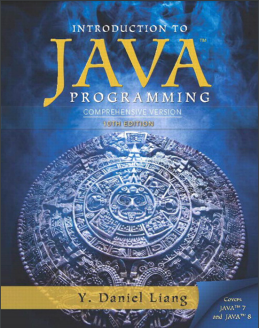This repo contains my solutions to the end-of-chapter exercise’s from Y. Daniel Liang’s Intro to Java Programming (10th Edition)
I've included links below to all the freely accessible companion material and quick links to navigate through my solutions by chapter.
See Contribution Guide for coding guidelines and information on how to contribute.
"Daniel Liang teaches concepts of problem-solving and object-oriented programming using a fundamentals-first approach . Beginning programmers learn critical problem-solving techniques then move on to grasp the key concepts of object-oriented, GUI programming, advanced GUI and Web programming using Java..."
-
-
Each solution should be its own self-contained program with minimal dependencies on other files. If you need multiple files please create a package for the exercise.
-
This allows us to utilize the Exercise Checking Tool Exercise Checking Tool to verify solutions.
package ch_01;
/**
* 1.1 (Display three messages) Write a program that displays Welcome to Java,
* Welcome to Computer Science, and Programming is fun.
*/
public class Exercise01_01 {
public static void main(String[] args) {
System.out.println("Welcome to Java");
System.out.println("Welcome to Computer Science");
System.out.println("Programming is fun");
}
}-
When to use Pull Requests
- To add new solutions, that do not already exist.
- To add new documentation and/or comments to existing exercise solutions.
-
How to use Pull Requests
- Fork the Master branch
- Create a feature branch (with a descriptive name) using the fork from step 1.
- Make your changes to your new branch (Only commit and push the files you plan to merge).
- Make a Pull Request into our intro-to-java-programming Master branch.
- Please feel free to open new Issues.
- To request a specific Exercise that you need answered.
- Be sure to include the Chapter and Exercise number.
- To request a change to an existing solution.
- You find an error in an existing solution.
- To request a specific Exercise that you need answered.
- Chapter 1 - Introduction to Computers, Programs, and Java

- Chapter 2 - Elementary Programming

- Chapter 3 - Selections

- Chapter 4 - Mathematical Functions, Characters, and Strings

- Chapter 5 - Loops

- Chapter 6 - Methods

- Chapter 7 - Single-Dimensional Arrays

- Chapter 8 - MultiDimensional Arrays

- Chapter 9 - Objects and Classes

- Chapter 10 - Object-Oriented Thinking

- Chapter 11 - Inheritance and Polymorphism

- Chapter 12 - Exception Handling and Text I/O

- Chapter 13 - Abstract Classes and Interfaces

- Chapter
14 - JavaFx Basics

- Chapter 15
- Event-Driven Programming and Animations

- Chapter 16 - JavaFx UI Controls and Multimedia
- Chapter
17 - Binary I/O

- Chapter 18
- Recursion

- Chapter
19 - Generics

- Chapter 20
- Lists, Stacks, Queues, and Priority Queues

- Chapter 21
- Sets and Maps

- Chapter 22 - Developing Efficient Algorithms
- Chapter 23 - Sorting
- Chapter 24 - Implementing Lists, Stacks, Queues, and Priority Queues
- Chapter 25 - Binary Search Trees
- Chapter 26 - AVL Trees
- Chapter 27 - Hashing
- Chapter 28 - Graphs and Applications
- Chapter 29 - Weighted Graphs and Applications
- Chapter 30 - Multithreading and Parallel Programming
- Chapter 31 - Networking
- Chapter 32 - Java Database Programming
- Chapter 33 - Java Server Faces
